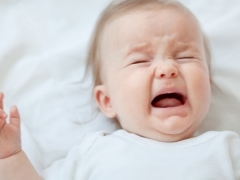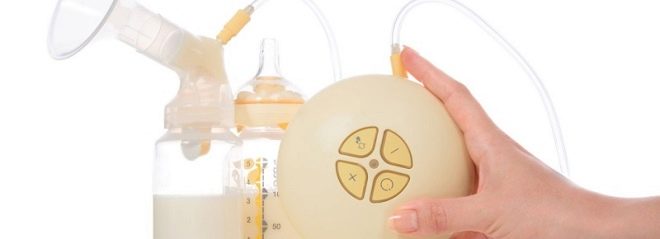Why does a baby cry or scream in a dream?
Most parents perceive baby crying is absolutely normal, because this is just a way to convey information about any needs of the baby to adults. Although in most cases the cause of crying is on the surface, there are also situations when guessing the wishes of a child expressed in this way is problematic. If a child cries in a dream, and does it regularly, some parents are able to really panic - all of a sudden the little one is faced with a serious problem and needs the help of doctors?
For this reason, the question of possible reasons for crying in a dream is of great interest for young families, but we will try to answer whether it is worth experiencing in this situation.
The specifics of sleeping baby
More often than not, children under one year old cry in a dream, and if a similar problem is observed in older children, they can often express in words the reason for what is happening. That is why we will not consider children of preschool age, but concentrate on babies.
Here it is necessary to immediately clarify that if a child under one year old shudders in a dream, moans, jerks his legs, bends or even sobs, then there is nothing strange or bad about it.
The fact is that most of their rest, the kids spend in the phase of the so-called “REM sleep”, which is also characteristic of adults, but only at the moment of falling asleep and immediately before a gradual awakening.
Such a difference from the adult norm is caused by the rapid development of the child’s brain, as a result of which the nervous system never actually rests. It is in this phase of sleep that a person dreams; therefore, it is not surprising that parents can observe a visible reaction to what is happening in the form of:
- "Running" pupils with eyes closed;
- Active limb movements;
- Triggering sucking reflex;
- Grimacing;
- Various sounds, including crying.
Such phenomena are called "physiological night crying," and according to doctors, they do not indicate the presence of any stimulus.
In some cases, a dream can actually act as such an irritant, in which a baby can end up in uncomfortable or even frightening conditions - even a much older child speaks in a dream, shouts and cries. In general, crying is an ordinary way to throw out emotional stress, so that the tears of the baby in a dream, if he does not wake up and quickly calms down, should not cause excitement.
Psychologists also believe that with the help of physiological crying, children instinctively check the situation around them - is Mom ready to come to the rescue if something happens? That is why in time, having shaken the baby who has not had time to wake up, you can make it so that he continues to sleep.
Experts do not advise to calm the baby too actively, because he himself is not going to wake up, and the zealous motion sickness can easily interrupt his sleep; in this case it will be enough to shake him gently or even just quietly sing something - the little one will subconsciously understand that everything is in order and will fall asleep again.
If the child does not observe any reaction, his brain signals insecurity, and then the baby wakes up and starts screaming much louder to attract the attention of adults.
At about the end of the first year of life, such a reflex of the “scanning” of space should disappear.
Too many emotions
In the first months of life, the infant does not have a sufficiently developed psyche so that what is happening around causes some strong emotions - in fact, it reacts only to discomfort. However, at the age of 3-4 months, there is a strong emotional shift, which is the first serious step towards the psychological growth of the personality.
This may not seem obvious to adults, but at this stage the child is already beginning to actively perceive the world around it and try to remember or understand it. Emotions accumulated during the day, even positive ones, do not allow the child to fall asleep quickly, excite and excite him, which leads to poor sleep quality, including crying.
At this stage, parents should move away from strict adherence to the schedule, and to a greater extent focus on the current needs of children. So, if the child slept poorly the previous time, the next period of wakefulness should be reduced. If this is not done, due to lack of sleep, the child again accumulates stress, and this will lead to further lack of sleep, resulting in a vicious circle.
To emotional reasons do not interfere with the child's sleep and did not provoke him to tears in a dream, follow a few simple rules:
- It is unacceptable to take away from the baby part of the time allotted for sleeping to lull. In order to ensure that he falls asleep on time, start to lay it in advance. Do not wait for the moment when the child begins to clearly show signs of fatigue - this is an indicator of excessive fatigue.
- Bright emotions, even positive ones, are not recommended for babies under one year old. Especially this statement is relevant in the afternoon, otherwise you can lose too much time for lulling.
- TV for young children is very harmful precisely because of the large number of emotions. Even calm cartoons give a lot of different information, they are encouraged by a large number of bright colors, and in general they don’t seem as simple and accessible to a child as they are to an adult, so they can cause poor sleep and crying at night.
As for nightmares, their existence at the age of less than one year has not been proven. Older children may cry because of them, but this is usually a one-time rather than a repetitive phenomenon. If the child complains about regularly scary dreams with a recurring plot, it makes sense to contact a psychologist.
Inappropriate microclimate
Since babies, as we have said, sleep much more sensitively than adults, it is not surprising that, in general, they are much more demanding of indoor conditions. The situation is further aggravated by the fact that a child under the age of one has little effect on the situation - he, after all, cannot take cover himself when it is cold, or open up when it is hot. The child may not wake up, but feel discomfort and cry in a dream, which will worsen the quality of rest and can lead to full awakening.
In order to avoid such situations, parents should pay great attention to creating truly comfortable conditions in the nursery and their ongoing support. Ideal comfort in understanding the baby looks like this:
- The temperature is about 18-22 degrees. It all depends on the individual qualities of the baby, and on the number and thickness of the diapers, in which he wrapped. The argument "a pair of bones does not ache" here does not work at all! If the baby is uncomfortable to fall asleep, he will cry in his sleep regularly.
- Humidity - in the range of 40-60%. Too dry air causes the mucous membranes of the upper respiratory tract to dry out and evaporates too much fluid from the baby’s body, but we want him to sleep soundly, especially since he cannot drink on his own and will cry.In our latitudes, air is usually overdried, and this problem can be solved with the help of a humidifier. Too humid air for our country is not typical.
- No dust. Getting into the nose of the baby, dust clogs the respiratory tract and interferes with the normal enrichment of the body with oxygen, although the child’s brain, actively developing even in a dream, is in dire need of it. Since the laying is taking place gradually, dust is one of the most common causes of crying in a dream without awakening. To eliminate dust, ventilate the room and carry out regular wet cleaning, as well as minimize the number of books, carpets, upholstered furniture and toys in the nursery.
- Fresh air. The growing body needs oxygen critically, so airing is almost a prerequisite before bedtime. If this is unacceptable due to climate or pollen allergies, pay attention to sophisticated modern air conditioning systems that can solve this problem.
How to solve the problem of hunger and thirst?
Infants want to eat much more often than adults, so the desire to eat in the middle of the night right up to crying is quite normal for them, but a person of any age can want to drink at night. However, the child, after such awakenings, will have to be put to sleep anew each time, which does not allow either mom or he to sleep, therefore one has to invent ways to reduce the number of such rises.
In the first months of life, completely avoiding nightly feedings will not work - you will not have to wake up anyway, but you can reduce the number of nightly alarms if you feed the baby more intensively during the day. If an adult is not recommended to eat before bedtime, then such a procedure is not only possible for the infant, but also useful, as it will ensure a stable sleep.
We have already mentioned how low-quality rest can cause constant night crying, therefore should be eaten in the evening, because a child of this age still does not eat anything that is difficult to digest.
At the same time, experts recommend to intensify the nutrition of the infant not as much in quantity (whether it be the actual weight of food at a time or the number of meals per day), as the quality. With those children that are fed baby food, the situation is clear - you just need to pay attention to more high-calorie foods.
As for babies that feed on mother's milk, there is a very important point that not everyone knows about: the fact is that when you attach the baby to the breast, the so-called front milk. It has a relatively low nutritional value, but in terms of volume, the baby doesn’t need much - it feels that the tummy is full and refuses to drink further, only the nutrients obtained from the front milk do not suffice for a while. As a result, the baby, who seemed fed up, very quickly wants to eat again, and therefore cries in a dream.
If the baby consumes clearly some milk at a time, it should be decanted first so that it receives only the most high-calorie product.
Babies water during night feedings should be offered only in the heat, but if the baby is artificially fed, water must necessarily accompany each feeding session.
Teeth
Very often, the cause of night crying is a phenomenon characteristic of all babies, without exception - teething. So babies have a very hard time, because the itching and sore mouth they feel constantly.
Of course, even in such a situation, the child still needs to sleep, so it is possible to lull him to sleep, but at the moments when the pain intensifies, he can cry out, begins to cry sharply and wake up. The problem is especially acute if the baby currently has more than one tooth cut.
Of course, there may be several reasons for crying at night, but if a child is constantly trying to nibble clothes, toys and any other available items, you can be sure that teething is one of them.
For a long time this problem was considered practically unsolvable, but modern medicine is already able to offer a solution in the form of a special anesthetic gel. Be sure to note that this medicine, like almost all other medicines, in the case of young children can be used only after consulting a doctor.
Special silicone teethers will help the child to scratch the itchy jaw, which somewhat reduces discomfort from what is happening and helps to protect other objects from trying to nibble them, especially since it can even be dangerous for the baby.
Is the weather at fault?
It is no secret that abrupt weather changes can adversely affect the well-being of some people. If earlier it was assumed that such sensitivity is characteristic mainly for older people, today many experts believe that even some babies are able to respond to the fads of the climate.
Even risk groups are distinguished: difficulties during childbirth and cesarean section, as well as diseases when the fetus or increased intracranial pressure allegedly increase the likelihood that the child will manifest a synoptic "gift", which, in turn, will interfere with his rest and may cause a night crying.
On the example of adults, it has been noticed that the following phenomena are especially strongly felt:
- Abnormal activity of the sun;
- Gusting wind;
- Jumps in atmospheric pressure;
- Change of weather from sunny to rain;
- Precipitation of any kind.
At the same time, doctors cannot give an exact answer to the question why some children react to changes in the weather, while others do not. Moreover, they are unlikely to make such a diagnosis as “meteosensitivity”, therefore they will not advise specific treatment.
If you yourself see a certain pattern in the behavior of your child related to weather changes, and still want to get medical help, it is best to contact a neurologist, because it is he who solves any issues of hypersensitivity.
How to improve the sleep of the baby and sleep? Dr. Komarovsky will answer in this video.




























